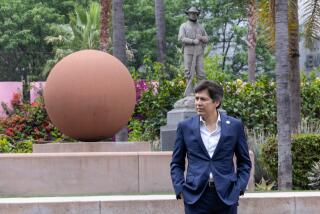L.A. jazz saxophone player and bandleader
- Share via
Buddy Collette, a Grammy-nominated jazz saxophonist, flautist, bandleader and educator who played important roles in Los Angeles jazz as a musician and an advocate for the rights of African American musicians, has died. He was 89.
Collette died Sunday at Cedars-Sinai Medical Center in Los Angeles after suffering shortness of breath a day earlier, according to his daughter Cheryl Collette-White.
Collette’s virtuosic skills on saxophones, flute and clarinet allowed him to move easily from studio work in films, television and recording to small jazz groups and big bands.
He was, in addition, one of the activists instrumental in the 1953 merging of the then all-African American musicians union Local 767 and the all-white Local 47.
“I knew that was something that had to be done,” Collette told writer Bill Kohlhaase for a Times story in 2000. “I had been in the service, where our band was integrated. My high school had been fully integrated. I really didn’t know anything about racism, but I knew it wasn’t right. Musicians should be judged on how they play, not the color of their skin.”
Collette had already crossed the color bar before that in 1949 and 1950 by performing as the only African American musician in the orchestra for Groucho Marx’s “You Bet Your Life” radio and television shows.
“We integrated the Academy Awards too,” Collette said. “It was 1963, when Sidney Poitier won. We were going to picket that thing. But I was in the band, with saxophonist Bill Green and harpist Toni Robinson-Bogart.”
Along the way, Collette, not satisfied with having established his own career in the studios, continually laid the foundation for other African American players.
“One of the things we jazz musicians are proud of is the fact that music to us has no color, no religious, no sexual, no other kinds of barriers,” says composer/bandleader John Clayton, “but it wasn’t that way in the studios of Los Angeles. And the thing about Buddy was that when he got his foot in the door, he kept opening it up for other musicians. That’s the kind of person he was.”
Collette came to national jazz prominence in 1955 as a founding member of drummer Chico Hamilton’s influential quintet.
The combination of Collette’s woodwinds and, especially, his flute playing with the cello of Fred Katz and guitar of Jim Hall created a timbre that remains one of the jazz world’s most uniquely appealing sounds.
Although West Coast musicians with Collette’s skills commonly moved to New York in search of wider visibility, Collette chose to remain in Los Angeles, where he worked for more than four decades as a first-call saxophone and woodwind specialist.
Performing and recording with Frank Sinatra, Nat “King” Cole, Nelson Riddle, Ella Fitzgerald, Duke Ellington, Count Basie, Charlie Parker, Sarah Vaughan and dozens of others, his resume encompasses a virtual history of jazz and traditional pop music in the second half of the 20th century.
“If one has to choose a local hero whose story is emblematic of the West Coast musical heritage with all its underrated brilliance, originality and traditions,” novelist and journalist Emory Holmes II wrote in The Times in 2000, “one could hardly do better than the amazing true life of Buddy Collette.”
As an educator, Collette served on the faculties of Loyola Marymount University, Cal Poly Pomona, Cal State Long Beach and Cal State Dominguez Hills.
Collette’s students included Eric Dolphy, Frank Morgan, Charles Lloyd and James Newton among others.
Collette’s many non-performing activities included urging the development of the UCLA Oral History project, “Central Avenue Sounds” the co-founding of JazzAmerica, a nonprofit organization working to provide education to gifted high school musicians; and the direction and production of a series of 1999 concerts celebrating Duke Ellington’s 100th birthday.
“Buddy was totally about sharing and helping other people,” said Michael O’Daniel, who worked with Collette on the concert series “Jazz at the Music Center” and in the co-founding of American Jazz Masters Day. “That’s the way he was raised and it was his philosophy throughout life. He was always extending a helping hand, regardless of whether it was a well-known musician or someone who was just starting out.”
In 1998, a stroke brought Collette’s playing career to an end. But he continued to be an inspiration to young musicians and a vital participant in the city’s jazz world.
William Marcel Collette was born Aug. 6, 1921, in Los Angeles. His father, Willie Collette, a pianist, was from Knoxville, Tenn., and his mother, Goldie Marie, a singer, was from Kansas City. Collette was raised in Watts, and was a childhood friend and contemporary of former L.A. Mayor Tom Bradley and close musical associate of bassist/composer Charles Mingus, whom Collette persuaded, at the age of 13, to switch from cello to bass.
While still in his teens, Collette was an active participant in the rich musical environment taking place around Central Avenue during the pre-World War II years. After serving in the U.S. Navy during the war, he begin his long career as a mainstay of the Southland music scene.
In 1998, Mayor Richard J. Riordan designated Collette “A Living Los Angeles Cultural Treasure.” Collette’s autobiography, “Jazz Generations: A Life in American Music and Society,” written with Steven Iosardi, was published in 2000.
Collette is survived by daughters Cheryl, Veda and Crystal, son Zan, eight grandchildren and nine great-grandchildren.
More to Read
The biggest entertainment stories
Get our big stories about Hollywood, film, television, music, arts, culture and more right in your inbox as soon as they publish.
You may occasionally receive promotional content from the Los Angeles Times.










